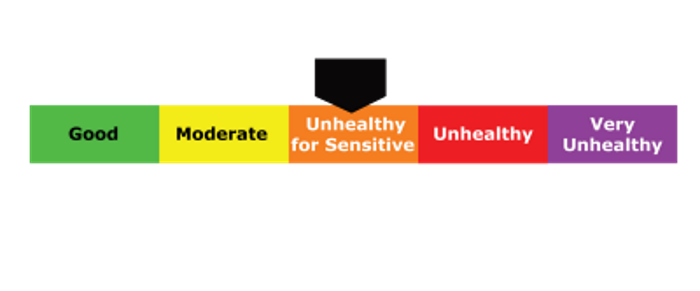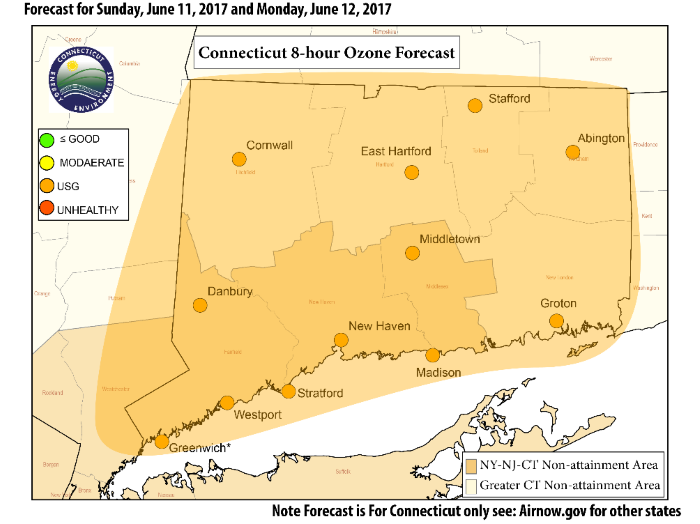Press Releases

06/12/2017
Department of Energy & Environmental Protection Forecasts Elevated Levels of Ozone for Connecticut Sunday June 11 and Monday June 12, 2017
Connecticut’s Department of Energy and Environmental Protection (DEEP) is forecasting our air quality will be Unhealthy for Sensitive Groups (USG) across the state on Sunday and Monday – another example of why the U.S. Environmental Protection Agency (EPA) must move forward to protect public health by implementing the latest ozone standard.
Connecticut’s Worst Predicted Air Quality for Sunday and Monday June 11 and June 12
Weather Summary
High pressure located along the southeast east coast will deliver mostly sunny skies, a hot air mass with highs each day in the 90s, and southwest winds transporting poor air quality into Connecticut for Sunday and Monday. The sunny, hot weather will enable additional transported and homegrown emissions to mix into the secondary pollutant of ozone contributing to the poor air quality.
Delayed Federal Action Impacts Connecticut
In October 2015, EPA strengthened the eight-hour ozone standard from 75 parts per billion (ppb) to a more stringent standard of 70 ppb. On June 6th, however, EPA Administrator Scott Pruitt announced EPA is delaying the implementation of the 2015 ozone standard by one year – slowing down the installation of more stringent air pollution controls and public health protections in key locations across the nation where they are needed.
DEEP Commissioner Rob Klee responded to Pruitt’s action, stating, “This delay will prolong the exposure of Connecticut residents to unhealthy air – with impacts most severe on those who live in urban areas and sensitive groups, such as senior citizens, infants and those with respiratory or heart ailments. In fact, a 2016 report from the American Thoracic Society found that air pollution accounts for 168 deaths a year in Connecticut.
“Unhealthy ozone levels like those forecasted for this weekend will continue as a result of federal inaction and Connecticut citizens need to pay attention to recommended actions to protect their health,” Klee added.
Last summer Connecticut reported 31 “bad air” days above the new standard. Going into this weekend’s ozone event Connecticut has already reported 3 “bad air” days this season.
Health Effects of Air Pollution
When air quality is in the USG category, there is an increased likelihood that certain populations will experience respiratory symptoms and breathing discomfort. Children and people with asthma or other respiratory disease are most at risk for experiencing symptoms. Active children and adults, and people with respiratory disease, such as asthma, should limit prolonged outdoor exertion. Peak ozone levels are predicted to occur between 2-8 PM EDT so make sure you get your activity or exercise in before or after these times to minimize health effects.
What You Can Do to Help
When air pollution levels are predicted to be “unhealthy for sensitive groups” DEEP recommends:
- Conserving electricity by setting air conditioners to 78°
- “Wait ‘til 8” to use energy intensive appliances like washing machines, dryers and dishwashers;
- Refueling your lawn mower and cutting the grass before noon;
- Driving less by carpooling, vanpooling or using public transit;
- Telecommuting if possible;
- Refueling your vehicle after dusk and never idling a vehicle unnecessarily; and
- Refraining from recreational wood burning.
We also need long term actions to get to the root of our air pollution problem in Connecticut. DEEP recommends you also consider these long-term energy reducing strategies:
- Make your home or business as energy efficient as possible – this drives down air pollution and puts money back in your pocket;
- Cars and trucks cause over half our air pollution, so consider driving an electric vehicle; and
- Consider investing in renewable energy like solar electric.
Knowledge is power! Ask your school if they participate in the School Flag Program, EPA’s Air Quality awareness tool that uses colored flags based on the AQI to notify teachers, students, administrators and the local community of air quality conditions.
Stay connected and access the daily AQI forecast and real-time air quality data
• Follow us on Twitter
• Sign up to get Air-Quality alerts through Enviroflash
• Visit DEEP’s AQI webpage or call 800-249-1234
• Go to EPA’s AIRNow web page
• Download EPA’s AIRnow app for your phone
• Sign up to get Air-Quality alerts through Enviroflash
• Visit DEEP’s AQI webpage or call 800-249-1234
• Go to EPA’s AIRNow web page
• Download EPA’s AIRnow app for your phone
Ozone Monitoring Season
DEEP monitors, tracks and forecasts daily air quality levels across Connecticut for ozone from May 1 through September 30 each year and for fine particulate matter (PM2.5) each day of the year. On April 28, 2017, DEEP began informing Connecticut’s regulated community and the general public of the ozone season via the State of Connecticut E-mail list serve and posting air quality forecasts on the DEEP web page, available here.
DEEP encourages daycare providers, summer camps and elder/senior centers to subscribe to the Air Quality Index (AQI). Subscribing to the AQI is fast and easy and will provide you with important information each day about Connecticut’s air quality through the spring and summer. The AQI link provides facts and information regarding ground-level ozone, its’ health effects, what today on high ozone day, and most importantly what you can do to help reduce ground level ozone in your backyard.
- Twitter: @CTDEEPNews
- Facebook: DEEP on Facebook



